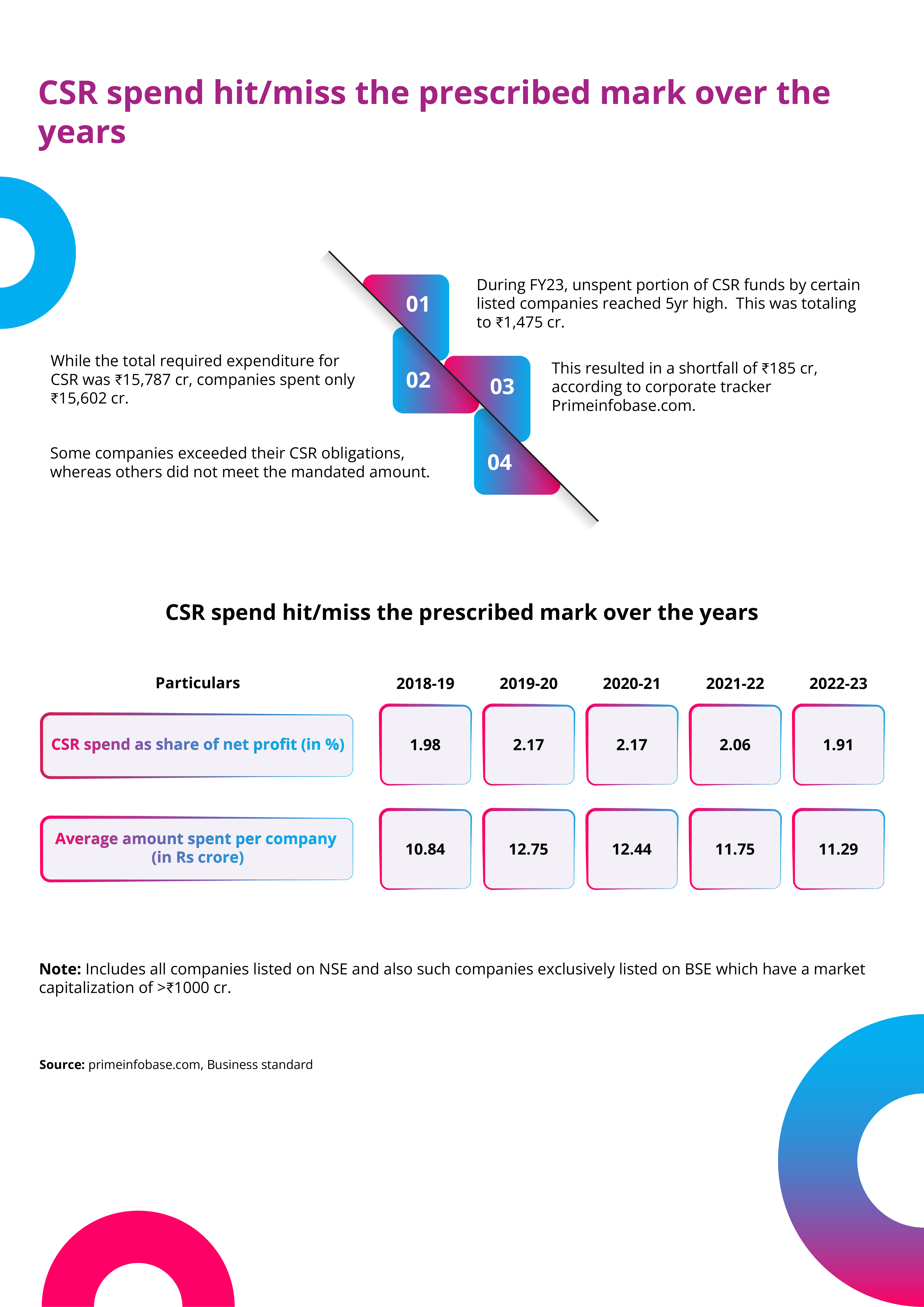In India, Corporate Social Responsibility (CSR) plays a crucial role in addressing various socio-economic challenges, from education and healthcare to environmental sustainability. Despite mandates for certain companies to allocate a portion of their profits to CSR, a significant portion of these funds often remains unspent.
According to primeinfobase.com, CSR spending by NSE-listed companies reached INR 15,524 crore in FY 2022-23, a 5% increase from the previous year. However, this figure falls slightly short of the mandated INR 15,713 crore. This difference is not simply "unspent," but largely represents a strategic transfer of INR 1,643 crore into Unspent CSR Accounts for future projects. Some companies exceeded their CSR obligations, whereas others did not meet the mandated amount.
This data, sourced from primeinfobase.com, covers 1,296 NSE-listed companies obligated to spend on CSR based on their net worth, revenue, and net profit. These companies are required to allocate 2% of their average profits from the previous three years toward CSR initiatives such as environmental projects, healthcare, sanitation, and skill development programs.
Understanding the difference between "Amount Unspent" and "Amount Transferred to Unspent CSR Account" is crucial. "Amount Unspent" reflects the immediate shortfall in a given year. "Amount Transferred," however, signals a commitment to future CSR projects (within the next three years, as allowed by the Companies Act). In FY 2022-23, the amount unspent was INR 1,470 crore while the amount transferred was INR 1,643 crore.
This nuance is critical because the transferred amount represents a planned investment, not a lack of commitment. It offers insights into how companies strategize their CSR activities, often earmarking funds for larger, multi-year projects.
Want to learn more about maximizing your CSR impact? Contact us today! |
In FY23, listed companies allocated INR 15,524 crore to CSR, slightly less than the required INR 15,713 crore.
The National CSR Portal also indicates that many large publicly listed companies have not met the required spending levels for CSR activities, despite being above the stipulated financial threshold.
In FY23, listed companies allocated Rs 99 for every Rs 100 required for CSR, marking the lowest ratio in five years. Comparatively, companies spent Rs 111 for every Rs 100 required in FY20.
The average CSR expenditure per company in FY23 stood at Rs 11.29 crore, a 4% decrease from FY22 and a 9% drop from FY21. Overall, listed companies spent 1.91% of their net profits on CSR initiatives, falling short of the mandated 2%.
CSR Spending hits and misses over the years

The National CSR Portal, managed by the Ministry of Corporate Affairs, reports that 4,855 companies have not met the required CSR spending amount. This group represents one-fifth of all companies subject to CSR regulations.
FY Year | Number of companies spending less than prescribed | % in total companies |
2018-19 | 4130 | 16.4 |
2019-20 | 4736 | 20.6 |
2020-21 | 3506 | 16.8 |
2021-22 | 3334 | 16.8 |
2022-23 | 4855 | 19.9 |
|
|
|
Table Two - Source: National CSR Portal, Ministry of Corporate Affairs, Business Standard Calculations | ||
CSR in India: An Overview
India's mandatory CSR framework, introduced in 2014, aims to leverage corporate resources for national development. The criteria for mandatory spending includes a net worth of INR 500 crore or more, revenue of INR 1,000 crore or more, or a net profit of INR 5 crore or more.
This framework, introduced in 2014, aims to harness corporate funds for national welfare, especially in sectors such as education, healthcare, skill development, and environmental conservation.
Current Trends and Challenges in Unspent CSR Funds
Challenges contributing to the "unspent" portion include identifying suitable implementing partners, navigating regulatory complexities, and capacity constraints, especially for smaller companies.
Comparative CSR : The US, The UK And EU
While these regions may not have the same level of unspent CSR funds as India, the concept of unused CSR funds is not directly applicable. Instead, the focus is on voluntary initiatives, regulatory frameworks, and market pressures to drive corporate social responsibility. However, some insights can be gleaned:
- The United States: Unlike India, CSR in the US is primarily voluntary, with companies relying on philanthropy and brand reputation as motivators. While some large companies have significant CSR programs, spending may not be mandated or tracked as rigorously.
The United Kingdom: The UK's approach to CSR has evolved over time, influenced by EU norms, industry guidelines, and legislation. While the government has defined CSR as voluntary action beyond legal requirements, the interpretation and implementation of CSR can vary widely among businesses.
While some stakeholders advocate for government legislation to drive CSR, others prefer a lighter touch approach. Recent legislative changes, like Section 135 of the Companies Act 2006, have expanded the scope of corporate responsibility to consider various stakeholders beyond shareholders.
- European Union: The EU has taken a more proactive stance on CSR, with some countries like France requiring large companies to report on their social and environmental impact. However, specific spending requirements may vary.
Current Trends and Challenges in Unspent CSR Funds
The rise in unspent CSR funds in FY23 highlights a complex set of challenges in CSR implementation despite existing regulatory requirements.
Here’s a breakdown of some of the key issues companies face:
- Implementation Challenges: Finding reliable, impactful on-ground partners for CSR projects can be difficult. Many companies face delays as they seek partners with adequate reach, expertise, and accountability.
- Compliance Complexity: The regulatory framework for CSR requires strict adherence to compliance standards. Navigating these requirements, especially for companies that are new to CSR or operate in highly regulated industries, can be time-consuming and may result in funds being left unspent.
- Capacity and Resource Constraints: Smaller companies or organisations with limited budgets or manpower often struggle with CSR mandates. These firms may lack dedicated CSR teams, making it harder to design, implement, and monitor projects effectively.
These issues represent more than just administrative obstacles. When CSR budgets go unused, essential projects in sectors like education, healthcare, and environmental sustainability suffer. Improved collaboration, simplified compliance, and additional support for smaller firms could help more funds reach these critical areas.
For companies aiming to optimise CSR impact, exploring digital transformation in education and other CSR initiatives may provide effective, scalable solutions.
Sectoral Impact of Unspent CSR Funds
Several sectors remain significantly impacted by underutilised CSR budgets, including education and healthcare. These sectors face an urgent need for corporate support, particularly in rural and underserved regions. For instance, education-related CSR initiatives, which can drive digital transformation in schools, lack sufficient resources to achieve their potential.
The education sector, being pivotal for India’s growth, deserves focused CSR initiatives to bridge skill gaps, provide digital literacy, and ensure better infrastructure.
A digital transformation in education could help develop a tech-savvy workforce for the future. Companies interested in understanding how digital innovation can empower education can explore this in-depth article.
Addressing the Root Causes of Unspent CSR Funds
Addressing unspent CSR funds effectively requires a well-planned approach, as unused budgets represent missed opportunities for social impact.
Here’s an expanded view on possible solutions:
- Strengthen Partnerships: Building strong alliances with NGOs and local organisations can help companies bridge knowledge gaps and gain on-ground support. This collaboration ensures projects are grounded in local needs, have better implementation rates, and build community trust.
- Streamline Regulatory Compliance: Simplifying regulatory processes and providing clear guidelines could make CSR activities more accessible, especially for smaller firms. Training programs and government support can help these companies navigate CSR mandates with fewer administrative hurdles.
- Transparency in Reporting: Robust reporting mechanisms allow for more accountability. Improved frameworks would provide real-time tracking of CSR spending, helping companies see where their funds go, what impact they have, and encouraging proactive adjustments when funds go unused.
Together, these steps could help companies fully utilise their CSR budgets, allowing funds to create meaningful and measurable impact in areas of need.
Role of Digital Transformation in CSR Strategy
Digital tools can improve CSR outreach, especially in remote and underserved areas. Incorporating tech solutions can streamline project management, track impact, and reduce fund wastage. Digital transformation initiatives are essential in sectors like education, where online resources can make a lasting difference.
Learn more about the need for CSR in education to understand how corporate contributions can make an impact.
The Future of CSR in India: Moving Beyond Compliance
For Corporate Social Responsibility (CSR) to make a lasting impact on Indian society, companies must view it as more than just a legal requirement. By strategically integrating CSR into their core values, organisations can foster sustainable growth that benefits both communities and the business itself.
Rather than merely fulfilling obligations, forward-thinking companies are treating CSR as a vehicle for social change, addressing pressing needs in education, healthcare, environmental sustainability, and more. Moving beyond compliance means building initiatives that are not only socially beneficial but also aligned with the organisation’s long-term goals, adding authenticity and purpose to CSR activities. When CSR is truly embedded in a company’s culture, it creates genuine community connections, builds a positive brand reputation, and often results in higher employee morale, as staff feel proud to work with an organisation committed to societal betterment.
This future-oriented approach to CSR requires collaboration with local NGOs and experts who bring invaluable on-ground experience. Streamlining reporting and compliance processes can also encourage smaller companies to participate more actively, reducing administrative hurdles and enhancing the transparency of CSR projects.
By embracing CSR as a strategic priority, companies in India can play a pivotal role in advancing social equity and sustainability, positioning themselves as catalysts for a brighter, more inclusive future.
Connect with Us: If you’re interested in collaborating on impactful CSR initiatives, reach out to our CSR experts here.
Realigning CSR for Greater Impact
India’s unspent CSR funds underscore the need for an evolved approach. By addressing implementation hurdles, enhancing partnerships, and adopting digital tools, companies can ensure their CSR contributions make a meaningful difference. Let’s aim for a future where CSR is synonymous with social impact, paving the way for a more inclusive India.
Technology Can Unlock CSR's True Potential
Technology has the power to bridge gaps in CSR implementation, ensuring funds are utilized effectively and equitably. Digital tools like impact tracking software, AI-driven analytics, and cloud-based collaboration platforms can simplify project management and enhance transparency. Platforms like Protean Life are uniquely positioned to support corporations and NGOs by offering seamless collaboration tools, real-time monitoring features, and scalable solutions tailored to address critical social challenges.
Conclusion
India's unspent CSR funds highlight an urgent need for a more strategic and integrated approach to corporate social responsibility. Beyond compliance, companies must embrace CSR as a core aspect of their business ethos, leveraging technology, forging strong partnerships, and streamlining processes to maximize social impact. This transformative shift not only addresses pressing socio-economic challenges but also strengthens brand reputation and employee morale. With a clear vision and a commitment to inclusive growth, Indian companies can redefine CSR as a catalyst for lasting social change, paving the way for a brighter, more sustainable future.
"Also Read" Section:
- Unlocking Education's Potential Through CSR: https://proteantech.in/articles/need-for-csr-in-education-sector/
- Empowering Students: CSR Scholarships Making a Difference: https://proteantech.in/articles/csr-education-scholarships/
- Vidyasaarathi: Bridging the Gap in Education Funding:https://proteantech.in/articles/education-csr-vidyasaarathi/
- Digital Transformation: Revolutionizing Education through CSR: https://proteantech.in/articles/digital-transformation-csr-education/
- CSR Success Stories: Inspiring Change in Education: https://proteantech.in/articles/vidyasaarathi-csr-success-stories/
- Story by Bruhadeeswaran R.

